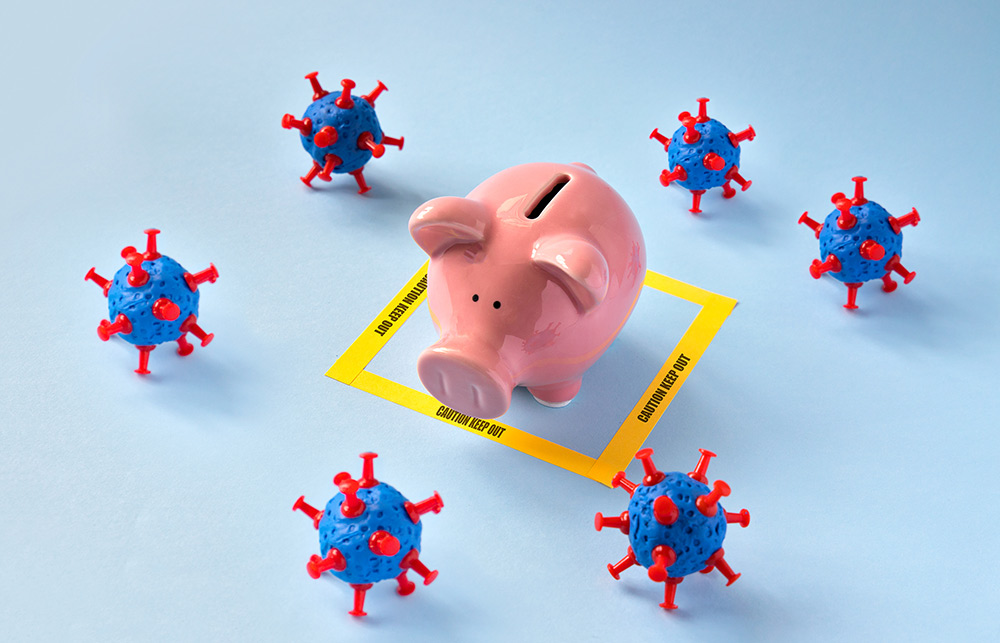
在新冠疫情期间,远程办公、居家办公津贴、每周冥想课程等福利已经成为招聘标配,从北弗吉尼亚州某管理岗的职位介绍就能够窥见一斑。
用人单位还为劳动者提供“家庭基金”,如果员工遇到经济困难或紧急情况就可以申请财务支持。
这种情况在未来将会越来越多。
过去一年,员工福利的内容发生了很大变化,也丰富了许多。比如许多员工取消了税前通勤卡,转而要求企业报销办公椅、站立式办公桌的购置费,补贴(子女在家上课产生的)家教费用。目前,许多企业正在为明年员工返回办公室做准备,所以需要评估哪些福利应当保留。在这个过程中,会反复提到两种关系密切的福利:心理健康支持和紧急情况下需要的应急基金。
美国最大的人寿保险公司保德信金融集团(Prudential Financial Inc.)的副董事长罗布•法尔松表示:“我们目前最关注大多数美国工人脆弱的心理状态和财务状况。雇主应该进一步提升员工福利水平,为员工提供安全感,遇到危机时帮助员工安然度过。要么为危机做好准备,要么只能危机后补救。”
保德信金融集团对美国劳动者进行了一项调查,发现超过一半的受访者表示去年承受的整体压力更大。其它主要发现还包括:
• 55%的受访者表示新冠疫情让自己意识到财务缺乏保障;
• 46%的受访者表示财务问题影响到睡眠;
• 福利方面的最大变化包括:开始缴纳或增加缴纳退休金、升级医疗保险,以及购买人寿保险。
上述发现与其它调查的结果不谋而合。NBC News与SurveyMonkey联合进行的一项调查发现,受新冠肺炎影响,41%的成年人表示“非常担心”新冠疫情对家庭财务状况的负面影响。
值得注意的是,劳动者哪怕在职也不确信已经挺过了疫情的影响。许多人的配偶或家庭成员遭遇失业,只能够靠一己之力来养活全家,一方面要抚养子女,另一方面又要赡养老人,这也让许多劳动者压力陡增。此外,整体经济的不确定性也迫使家庭考虑可能出现的各种情况,并据此检查财务状况。
从数据也可以看出美国人准备多么不足。美联储(Federal Reserve)的一项研究发现,如果临时需要400美元,超过四分之一的美国人需要举债或者变卖物品,12%的美国人根本凑不出这笔钱。
UPS、Etsy和万事达卡(Mastercard)等公司将为员工推出新的储蓄计划,协助员工建立应急基金,该基金的积蓄方式与401(k)相同,而不同之处则在于,员工在需要一两天的时间就能够拿到钱,比退休账户快得多。
当前,保德信金融集团等公司正在评估哪些福利将会予以保留,哪些福利在疫情后将取消。法尔松表示,福利分为两种:过渡性福利和永久性福利。例如,为儿童远程学习提供的家教补贴就属于过渡性福利,在学校已经准备开放校园的当下尤其如此。他表示,在财务上未雨绸缪的行为变化在疫情结束之后可能一直存在。
法尔松提及了千禧一代对工作场所的影响:千禧一代(跨入21世纪以后达到成年年龄的一代人——译注)员工的应急储蓄已经用光,相较之下,花光应急储蓄的X世代(20世纪60年代中期至70年代末出生的一代人——译注)和婴儿潮一代(1946年至1964年出生的一代人——译注)的比例分别为27%和16%。25%的千禧一代借出或取出了部分退休金,而X世代和婴儿潮一代提取退休金的比例分别为17%和10%。
人群特征也推动企业重新审视的另一项健康福利发生变化,即心理健康福利。
标准保险公司(Standard insurance company)对1400多名员工进行的一项调查发现,60%的千禧一代和70%的Z世代(1995年到2009年出生的人——译注)表示出现了心理健康问题,而在婴儿潮一代人群中,这一数字为20%。
Spring Health是一家为公司及其员工提供定制化心理健康服务的企业,其创始人及首席执行官埃普若•科赫表示:“五年前,用人单位才开始意识到千禧一代并不像前辈一样认为出现心理健康问题很丢人。”
她表示,疫情促使企业将员工帮助计划(Employee Assistance Programs)由“走过场的心理健康福利”提升为更有实质内容的员工服务,也作为支持员工发展的工具之一。
“用人单位终于认清现实,意识到需要提高对劳动者心理健康的支持。”她说,“我们希望所有人都可以得到应有的关怀。为避免企业盲目应对,有关方面正在搜集相关资源。”
她表示,此类需求将会延续到疫情之后。
科赫说:“我们要让用人单位明白,新冠疫情只是导火索,心理健康问题其实一直存在,并不是孤立现象,新冠疫情只是提供了集中爆发的环境。”(财富中文网)
译者:梁宇
审校:夏林
在新冠疫情期间,远程办公、居家办公津贴、每周冥想课程等福利已经成为招聘标配,从北弗吉尼亚州某管理岗的职位介绍就能够窥见一斑。
用人单位还为劳动者提供“家庭基金”,如果员工遇到经济困难或紧急情况就可以申请财务支持。
这种情况在未来将会越来越多。
过去一年,员工福利的内容发生了很大变化,也丰富了许多。比如许多员工取消了税前通勤卡,转而要求企业报销办公椅、站立式办公桌的购置费,补贴(子女在家上课产生的)家教费用。目前,许多企业正在为明年员工返回办公室做准备,所以需要评估哪些福利应当保留。在这个过程中,会反复提到两种关系密切的福利:心理健康支持和紧急情况下需要的应急基金。
美国最大的人寿保险公司保德信金融集团(Prudential Financial Inc.)的副董事长罗布•法尔松表示:“我们目前最关注大多数美国工人脆弱的心理状态和财务状况。雇主应该进一步提升员工福利水平,为员工提供安全感,遇到危机时帮助员工安然度过。要么为危机做好准备,要么只能危机后补救。”
保德信金融集团对美国劳动者进行了一项调查,发现超过一半的受访者表示去年承受的整体压力更大。其它主要发现还包括:
• 55%的受访者表示新冠疫情让自己意识到财务缺乏保障;
• 46%的受访者表示财务问题影响到睡眠;
• 福利方面的最大变化包括:开始缴纳或增加缴纳退休金、升级医疗保险,以及购买人寿保险。
上述发现与其它调查的结果不谋而合。NBC News与SurveyMonkey联合进行的一项调查发现,受新冠肺炎影响,41%的成年人表示“非常担心”新冠疫情对家庭财务状况的负面影响。
值得注意的是,劳动者哪怕在职也不确信已经挺过了疫情的影响。许多人的配偶或家庭成员遭遇失业,只能够靠一己之力来养活全家,一方面要抚养子女,另一方面又要赡养老人,这也让许多劳动者压力陡增。此外,整体经济的不确定性也迫使家庭考虑可能出现的各种情况,并据此检查财务状况。
从数据也可以看出美国人准备多么不足。美联储(Federal Reserve)的一项研究发现,如果临时需要400美元,超过四分之一的美国人需要举债或者变卖物品,12%的美国人根本凑不出这笔钱。
UPS、Etsy和万事达卡(Mastercard)等公司将为员工推出新的储蓄计划,协助员工建立应急基金,该基金的积蓄方式与401(k)相同,而不同之处则在于,员工在需要一两天的时间就能够拿到钱,比退休账户快得多。
当前,保德信金融集团等公司正在评估哪些福利将会予以保留,哪些福利在疫情后将取消。法尔松表示,福利分为两种:过渡性福利和永久性福利。例如,为儿童远程学习提供的家教补贴就属于过渡性福利,在学校已经准备开放校园的当下尤其如此。他表示,在财务上未雨绸缪的行为变化在疫情结束之后可能一直存在。
法尔松提及了千禧一代对工作场所的影响:千禧一代(跨入21世纪以后达到成年年龄的一代人——译注)员工的应急储蓄已经用光,相较之下,花光应急储蓄的X世代(20世纪60年代中期至70年代末出生的一代人——译注)和婴儿潮一代(1946年至1964年出生的一代人——译注)的比例分别为27%和16%。25%的千禧一代借出或取出了部分退休金,而X世代和婴儿潮一代提取退休金的比例分别为17%和10%。
人群特征也推动企业重新审视的另一项健康福利发生变化,即心理健康福利。
标准保险公司(Standard insurance company)对1400多名员工进行的一项调查发现,60%的千禧一代和70%的Z世代(1995年到2009年出生的人——译注)表示出现了心理健康问题,而在婴儿潮一代人群中,这一数字为20%。
Spring Health是一家为公司及其员工提供定制化心理健康服务的企业,其创始人及首席执行官埃普若•科赫表示:“五年前,用人单位才开始意识到千禧一代并不像前辈一样认为出现心理健康问题很丢人。”
她表示,疫情促使企业将员工帮助计划(Employee Assistance Programs)由“走过场的心理健康福利”提升为更有实质内容的员工服务,也作为支持员工发展的工具之一。
“用人单位终于认清现实,意识到需要提高对劳动者心理健康的支持。”她说,“我们希望所有人都可以得到应有的关怀。为避免企业盲目应对,有关方面正在搜集相关资源。”
她表示,此类需求将会延续到疫情之后。
科赫说:“我们要让用人单位明白,新冠疫情只是导火索,心理健康问题其实一直存在,并不是孤立现象,新冠疫情只是提供了集中爆发的环境。”(财富中文网)
译者:梁宇
审校:夏林
The job posting for a northern Virginia account executive itemizes the perks now standard in a pandemic: telecommuting, work-from-home stipend, weekly meditation classes.
And … access to a “Family Fund, created to allow employees to request financial support when facing financial hardship or emergencies.”
Get ready to see this more often.
Benefits packages have morphed and expanded greatly over the last year; workers canceled pre-tax commuter cards, for example, and instead demand reimbursement for office chairs, standing desks and tutors to supplement homeschooling. As companies prepare to return to work over the next year, they are assessing which offerings might remain, and repeatedly land on two interrelated areas: mental-health support and rainy-day funds in case of emergency.
“Our focus right now is the fragile state of most American workers and their state in terms of financial resiliency,” said Rob Falzon, vice chairman of Prudential Financial Inc., the largest life insurer in the United States based on total assets. “Benefits packages must evolve to create a sense of resiliency so as we hit crises, employees are able to sustain themselves through it. We can either repair or we can prepare for crises.”
Prudential conducted a survey of American workers and found more than half report their overall stress is worse in the last year. Other key findings:
• 55% of workers say the pandemic made them realize they are not financially secure;
• 46% lost sleep because of financial concerns;
• The top changes made to benefits are to increase or start to contribute to a retirement plan, upgrade health insurance and enroll in life insurance.
These findings are echoed in other surveys. An NBC News/SurveyMonkey poll finds 41% of adults are “very worried” about the negative economic effect on their household finances, thanks to COVID-19.
Significantly, simply being employed is not enough to assure workers they’ve escaped the pandemic economy’s wrath. Many are contending with the job losses of spouses or other members of a household, and one salary must now support many. Stress is rising as workers juggle demands of childcare and eldercare. Further, the uncertainty of the overall economy is forcing families to construct potential scenarios and check their financial health against them.
The data underscore underpreparedness. A Federal Reserve study finds that more than a quarter of Americans would need to borrow money or sell something to cover a $400 expense; 12% couldn’t even cover it.
Companies such as UPS, Etsy and Mastercard are rolling out new savings plans for their workforces where employees can create an emergency fund and accumulate cash in the same way they contribute to their . The difference is they can access the money in a day or two, much faster than retirement accounts.
As companies like Prudential examine what stays and what goes, Falzon says perks are being categorized as transitional and permanent. Reimbursement for, say, tutors for remote-learning kids falls in the transitional category, especially as schools prepare to open again. Securing a financial cushion, he says, feels like a behavioral change that might outlast the pandemic.
He cites the impact of millennials on the workplace: Millennial workers have exhausted their emergency savings, compared to 27% of Gen-Xers and only 16% of boomers. A quarter of millennials borrowed or took a withdrawal from their retirement plans, compared to 17% of Gen-Xers and 10% of boomers.
This demographic cohort is also changing another health benefit companies are rethinking: mental health benefits.
A poll of more than 1,400 workers by the Standard insurance company found 60% of millennials and 70% of Gen Zers reported mental health issues, compared with 20% of baby boomers.
"Five years ago, employers were just starting to realize millennials feel less of a stigma around mental health issues," said April Koh, CEO and founder of Spring Health, which tailors mental-health services for companies and their workforces.
She said the pandemic has pushed companies to move beyond EAP (Employee Assistance Programs) as “check-the-box mental health benefits” into something more substantive and in service of workers’ development.
“Employers are starting to wake up to this reality they need to do better,” she said. “We want to be making sure to match each person with the right care for them. There’s a movement to find the right resource for them so they don’t have to go through this guessing game.”
That need, she says, will outlast the pandemic.
“The pandemic has been an accelerator,” Koh said. “We need to make sure employers know it was an accelerant rather than an isolated spike. These mental health issues have always existed.”






